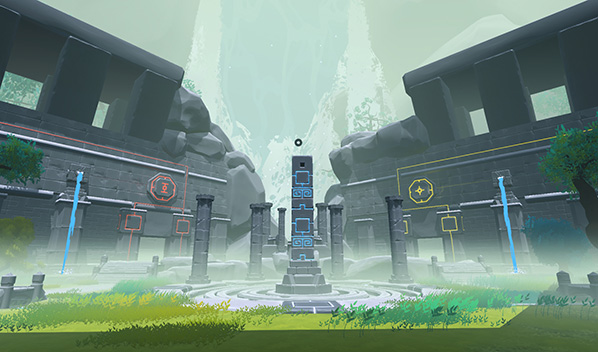Synopsis:
At the game's center lies an abandoned temple asking players to uncover its secrets. Throughout this journey players will encounter various mysterious devices allowing them influence over their surroundings and broaden their understanding of the game's environment. Interacting with these devices will task players with solving various puzzles that will challenge them to create an understanding of their functional nature and narrative purpose. Knowledge that will be required to uncover the temple's mysteries.
Background:
The game was realized as a student project at the FH Offenburg with a 4 person team as an attempt to expand on experiences in 3D game development. Project priorities focused on maintaining visual cohesion, creating engaging puzzles concepts, including some form of narrative integration and retaining scalable design principles. Notable challenges were fully adapting from more traditional production practices towards more fluid and flexible approaches, the technological research into VFX to create the look of the game, planning around meaningful time estimates due to inexperience.
During the project experiences with Z-Brush, Substance Painter, Unity tool development, performance optimization and version management were acquired or deepened.
Notable inspirations included games like “Rime” for it's visual style, “The Witness” and “TIS-100” for their take on puzzle design and “Journey” as well as “Dark Souls” for their approach to narrative integration.
Team Reflection:
Philipp Degasper: The most rewarding aspect of this project was enabling my fellow team members by writing and providing them development tools that made their lives easier by streamlining tedious implementation processes and letting them focus on the more creative aspects of development.
Klaus Schwärzel: What resonated with me the most was seeing all the different parts of the project develop and slowly come together in the end and create a real game. During production it is often difficult to get a real feeling of what the final game will be like when you're working only on your part of it. Also recognizing your own creations in the final game is a really cool feeling.
David Paul: When you work on something alone you become very aware of your own limitations and shortcomings and you try to be creative to find solutions that hide these or work around them. So making a game in a small team like this where everyone has different strengths and talents feels very liberating in the possibilities that suddenly become available to you. My favorite experience has always been coming together as a group and then being able to create something that would have been too big for one person alone.
Nikolai Bartsch: Personally I was really taken with how game development requires intricate cooperation of so many different types of media to create the feel of the game. Since our team was really small it was required of everyone to wear different hats as needed during development and allowed us to acquire experiences in many different areas of media creation.
Projektteam:
David Paul, Klaus Schwärzel, Nikolai Bartsch, Philip Degasper
Projektbetreuung:
Prof. Sabine Hirtes
